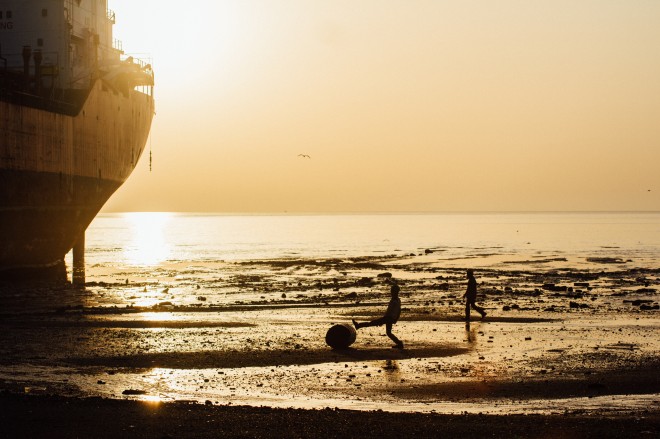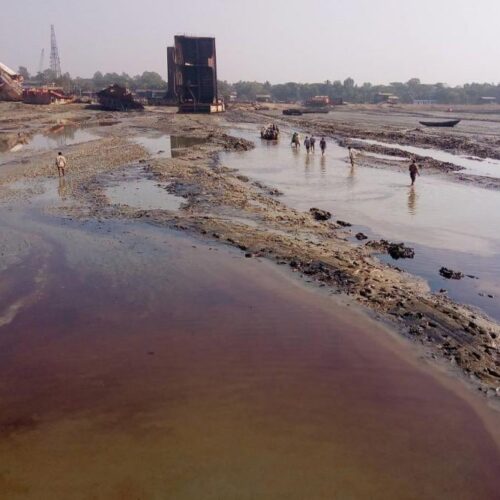Press Release – Maersk end-of-life vessels to hit the beaches again. NGOs denounce container ship company’s step back to boost profits
The NGO Shipbreaking Platform and Transport and Environment (T&E) denounce Maersk Group’s decision to beach their end-of-life vessels in India [1]. The world’s leading container ship owner was previously guided by a progressive policy on ship recycling: its old vessels were dismantled in modern ship recycling facilities in either China, Turkey or Europe. Maersk’s decision to resort to the low-cost beaching method in India undermines European efforts to improve global conditions and the company’s position as industry leader.

The Platform had welcomed Maersk’s initial idea to set up a long-term cooperation with stakeholders in India provided that the objective was to set up a modern ship recycling facility in line with the safety and environmental requirements set out by the European Ship Recycling Regulation. However, the hasty decision to sell off end-of-life vessels to Alang shows that the decision is merely driven by profits. In times of low freight rates, Maersk intends to boost its profits by selling to yards that do not comply with European standards.
All yards in Alang dismantle vessels in the intertidal zone. This means that ships are broken in an unprotected marine environment – a method which has been identified at the international level as one that needs to be phased-out and that European law has banned. Environmental concerns remain linked to the abrasion of toxic paints during the beaching process and when cut-off blocks and hulls are winched further up the beach, oil spills and the release of slag and paints chips into the water, and the debris created by the gravity method when blocks crash down on the intertidal zone.
Moreover, working and living conditions in Alang remain inadequate. The lack of decent accommodation will not be solved before the first Maersk vessels arrives in Alang, nor will there be access to a proper hospital specialised in accidents and burn wounds. Maersk seems also to ignore the lacunae of proper downstream waste management in India: asbestos-containing materials can and are re-sold freely and PCBs cannot be properly destroyed. These issues are not dealt with by the Hong Kong Convention - for European Union approval these problems will however need to be addressed.


NOTE
[1] Maersk has stated in Danish press that several of their ships will be sold to the beach of Alang in the coming six months.
Related news

Platform News – NGOs maintain pressure on owners and scrap dealers of FPSO North Sea Producer
16 August of last year the FPSO NORTH SEA PRODUCER was beached in Chittagong, Bangladesh. The ship was allowed to leave the UK based on the… Read More

Press Release – Sale of asbestos-laden aircraft carrier São Paulo raises concerns
The NGO Shipbreaking Platform, Basel Action Network (BAN), BAN Asbestos France, International Ban Asbestos Secretariat (IBAS), İstanbul Isig Meclisi and Brazilian ABREA have alerted the Turkish Ministry… Read More

Platform publishes South Asia Quarterly Update #34
Seven workers suffered an accident on South Asian beaches in the second quarter of 2023.
... Read More
Press Release – Ship owner and two directors fined by Dutch Court for breaching EU waste law
Dutch company Jumbo and two of its directors fined for their involvement in the illegal export of an end-of-life ship to Turkey for recycling.
... Read More
Press Release – Bangladesh: shipping firms profit from labour abuse
New report reveals network used by shipowners and shipbreaking yards to circumvent international laws prohibiting the dumping of end-of-life ships on South Asian beaches.
... Read More
Platform News – Clean Shipping Coalition: Maersk undermines its reputation with plan to circumvent ship recycling law
The Clean Shipping Coalition criticises container ship giant Maersk for its statement that is considers to flag out end-of-life vessels from the Danish or other European registries… Read More

Press Release – NGOs respond to legal threats by shipbreaking industry and withdraw from industry conference
On Monday, the NGO Shipbreaking Platform, an international coalition of labour, human rights and environmental organisations, withdrew their participation from the TradeWinds Ship Recycling Forum that starts… Read More

